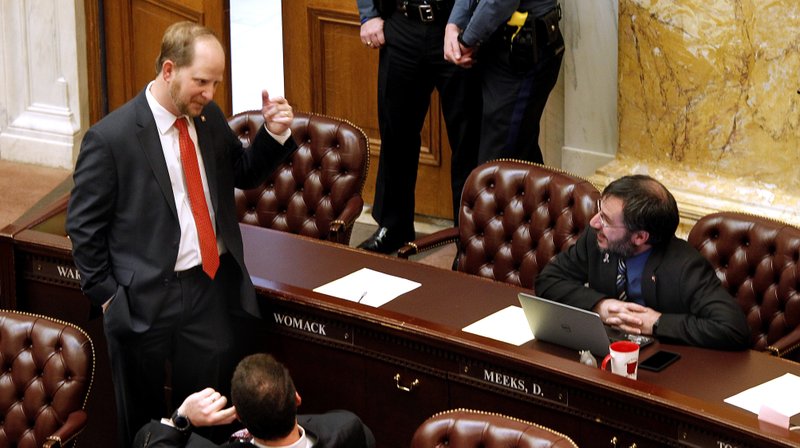Legislation that would enact Gov. Asa Hutchinson's proposed state government reorganization cleared its first legislative hurdle late Wednesday afternoon.
In a voice vote with a couple of dissents, the House State Agencies and Governmental Affairs Committee recommended that lawmakers approve House Bill 1763 by Rep. Andy Davis, R-Little Rock, after Davis explained the bill to the committee for several minutes and then answered several questions about it. No one testified for or against the bill.
Davis said he plans to ask the House to approve the bill today.
The 2,049-page bill would reduce the number of state agencies reporting to the governor from 42 to 15 and consolidate agencies and state entities into 15 Cabinet-level agencies headed by secretaries, effective July 1 of this year.
If enacted, the proposed reorganization of state government would represent the most sweeping overhaul since then-Gov. Dale Bumpers, a Democrat, led an effort to merge 60 agencies into 13 reporting to him through Act 38 of 1971.
[RELATED: Complete Democrat-Gazette coverage of the Arkansas Legislature]
HB1763 would create the following Cabinet level-departments: agriculture; commerce; corrections; education; energy and environment; finance and administration; health; human services; inspector general; labor and licensing; military; parks, heritage and tourism; public safety; transformation and shared services; and veteran affairs.
Hutchinson, a Republican, has projected savings of about $15 million a year from the plan starting in fiscal 2021, which begins July 1, 2020.
Davis told the House committee that he served on the governor's Transformation Advisory Board and "we spent a couple of years looking at different ways to try to make state government work more efficiently, not necessarily solely focused on savings, but focused on making things work better and provide services in a better way to our citizens."
He said the House and Senate State Agencies and Governmental Affairs Committees have reviewed 16 bills that he introduced previously and "we have now combined those bills into the final Transformation and Efficiencies Act of 2019.
"This is an administrative reorganization," Davis told the House committee.
"No funds are taken from any board, commission or agency. No positions are eliminated. All policy-making authority remains where it is now in current statute."
There are some retirement mechanisms to make sure that "everyone is able to maintain their current retirement plan, even if they get transferred to a different location," he said.
Davis said the bill would allow the governor to appoint a transition team with 25 state employees "to map out a plan on how to best implement this.
"One major change that has been made in the bill -- really, to try to clarify a lot of concerns people have had -- is we have defined consultation when we talk about so-and-so executing some action in consultation with the [Cabinet-level] secretary," he said. "If we are talking about a board or a commission, in that case, consultation means receiving input, review and recommendations from the secretary, but it does not include approval or consent. So a board that has rule-making authority today will consult with the secretary on those actions, but does not have to get approval or consent from that secretary. If we are talking about some other state entity, then that consultation does include approval and consent from the secretary."
In response to a question from Rep. Jim Dotson, R-Bentonville, Davis said there have not been any other major changes in the legislation since the 16 bills were filed.
"Originally we were going to put cosmetology and massage therapists under [the Department of] Labor and Licensing. We agreed to leave them in [the Department of] Health," he said.
In response to a question from Rep. John Payton, R-Wilburn, Davis said the salaries of the secretaries of the Cabinet-level agencies have not been determined.
"The bill doesn't set out what anybody's salary is [or] what their pay scale is," he said.
"It does set out the creation of those positions and then salary and benefits would be handled through the Legislative Council process like any other new position would be," he said. "The bill also says that all of this has to be done inside existing funds and appropriations, so there is not going to be any increases specifically for those positions. They will have to find the savings somewhere else."
Under HB1763, the Office of Personnel Management, as directed by the governor, would be required to establish and submit the appropriate class code, grade or line-item maximum salary for each Cabinet-level secretary to the Legislative Council, or to the Joint Budget Committee if during a legislative session, for review prior to July 1 of this year. The secretary positions would be funded from existing resources or the State Central Services Fund, as determined by the chief fiscal officer.
Earlier in the day, the House committee recommended approval of House Bill 1505 by Rep. Rick Beck, R-Center Ridge.
The bill would require the secretary of each Cabinet-level department created by the Transformation and Efficiencies Act of 2019 to submit and present to the Senate and House State Agencies and Governmental Affairs Committees a summary of the proposed reduction of at least 1 percent in total general revenue expenses of the transferred state entities compared to the expenses of those separate entities in fiscal 2019, which ends June 30. The report would be presented to the committees two weeks prior to the start of the fiscal session in 2020.
Metro on 03/14/2019
